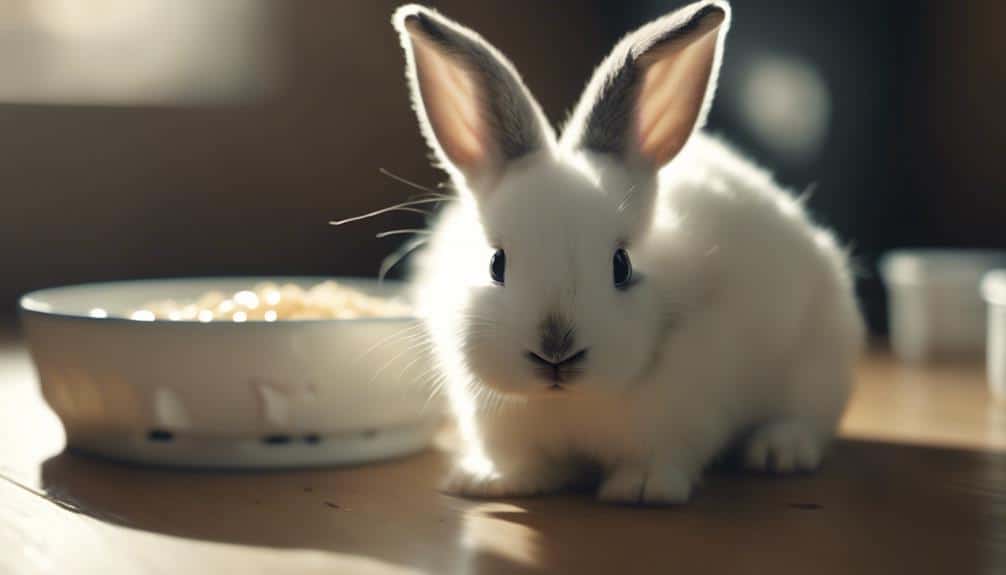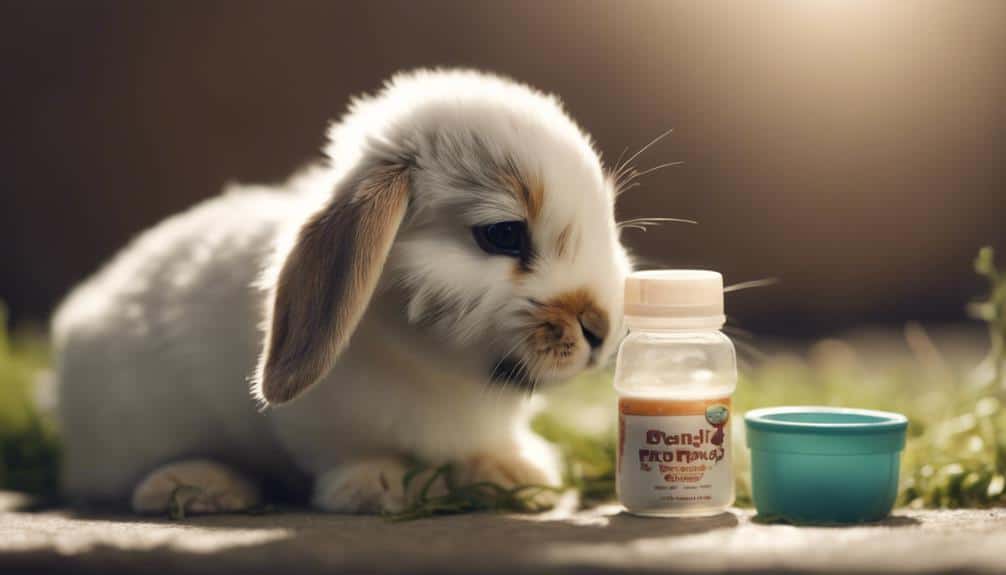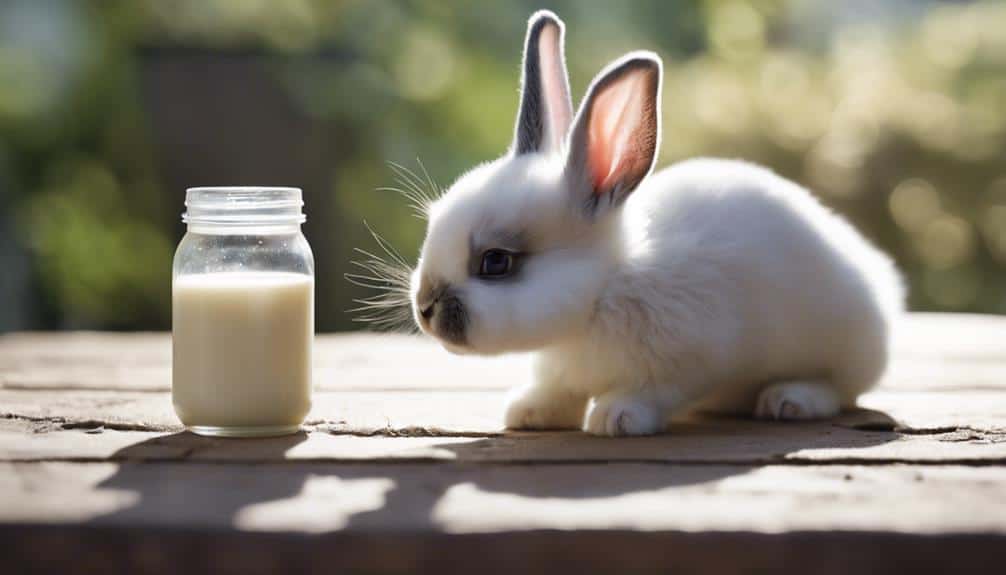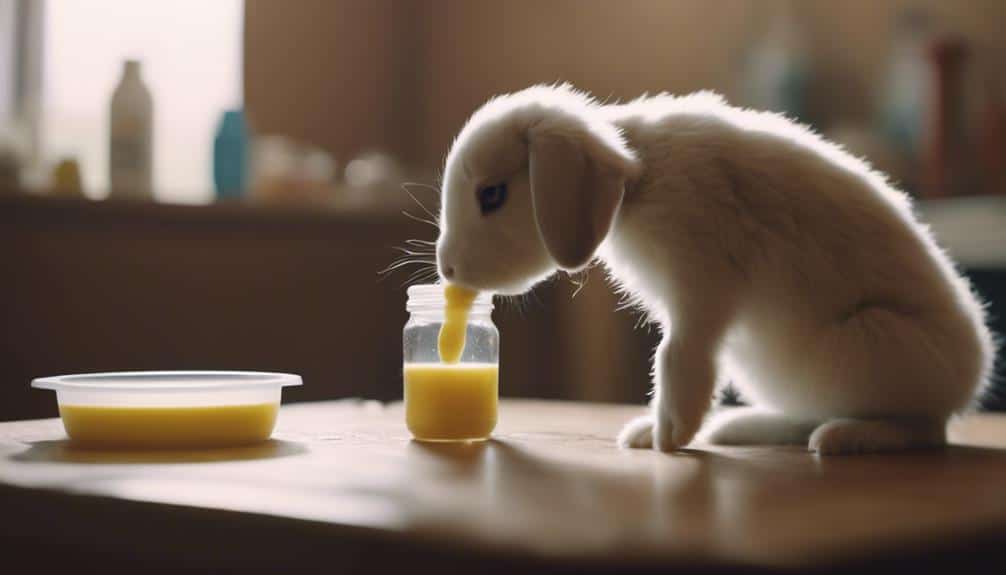Can a baby rabbit drink dog puppy milk? While it might seem like an easy solution, there are some key things to consider before making that choice.
Baby rabbits have very specific nutritional needs that are crucial for their health and development.
So, it's essential to understand the potential risks of feeding them dog puppy milk.
If you're considering this option, it's vital to know what's at stake.
Giving your baby rabbit the right start in life depends on it.
Contents
- 1 Key Takeaways
- 2 Potential Risks of Dog Puppy Milk
- 3 Nutritional Needs of Baby Rabbits
- 4 Impact on Baby Rabbit's Digestive System
- 5 Suitable Milk Replacements for Baby Rabbits
- 6 The Importance of Proper Feeding
- 7 Monitoring Health and Growth
- 8 Common Mistakes to Avoid
- 9 Transitioning to Solid Foods
- 10 Expert Recommendations for Care
- 11 Conclusion
Key Takeaways
So, you're wondering if you can give dog puppy milk to a baby rabbit? The answer is a definite no. Feeding baby rabbits dog puppy milk is super harmful because it lacks essential nutrients and can cause digestive issues.
Rabbits need specific nutrients to grow strong and healthy, but puppy milk just doesn't provide those. In fact, it can lead to malnutrition and stunted growth, which is really sad for these cute little creatures.
What's even worse is that dog puppy milk can weaken a rabbit's immune system and cause allergic reactions. That's a lot of stress and discomfort for a tiny baby rabbit.
On the other hand, there are some great milk replacers out there that are specifically designed for baby rabbits. KMR and Esbilac are two popular options that meet their nutritional needs.
So, it's crucial to feed your baby rabbit the right food to ensure they stay healthy and develop properly. Stick to rabbit-specific milk replacers, and you'll be giving your little bunny the best possible start in life.
Potential Risks of Dog Puppy Milk

So, you might think dog puppy milk is a convenient alternative for feeding baby rabbits, but it's not a good idea. In fact, it can be really harmful to them.
The main problem is that dog puppy milk doesn't have the right nutrients for baby rabbits. Rabbit milk has a higher concentration of fat and protein, which are essential for their growth and development. Dog puppy milk, on the other hand, can cause digestive issues and allergic reactions in rabbits. In severe cases, this can even lead to anaphylaxis, a life-threatening condition.
Feeding baby rabbits dog puppy milk can have serious consequences. They might become malnourished, dehydrated, and their growth could be stunted. Their immune system could also be weakened, making them more susceptible to diseases. It's crucial to give baby rabbits milk that's specifically formulated for their nutritional needs. Using dog puppy milk as a substitute can have long-term, detrimental effects on their overall health.
Nutritional Needs of Baby Rabbits
To promote the proper growth and development of baby rabbits, it's essential to understand their specific nutritional needs. Baby rabbits, also known as kits, have delicate digestive systems that require a specialized diet to thrive. Their primary source of nutrition should come from their mother's milk, which is rich in proteins and essential nutrients tailored to their needs.
If the mother isn't present or unable to feed the kits, you can use commercial kitten milk replacers (KMR) formulated specifically for kittens as a substitute. These replacers mimic the nutritional profile of a mother rabbit's milk and provide the necessary nutrients for the kits' growth and development.
When it comes to solids, domestic baby rabbits have different needs than their wild counterparts. Unlike wild rabbits that are weaned relatively early, domestic baby rabbits shouldn't be fed cow's milk or dog puppy milk. These can cause digestive issues and don't provide the necessary nutrients.
Baby rabbits have a high need for calcium, so it's crucial to provide them with alfalfa hay and leafy greens to support their bone development. These foods are rich in calcium and will help the kits grow strong and healthy bones.
Ensuring that baby rabbits receive a balanced diet that meets their nutritional requirements is vital for their overall health and well-being. By providing them with the right foods and nutrients, you'll give them the best possible start in life.
Impact on Baby Rabbit's Digestive System

Feeding baby rabbits dog puppy milk is a bad idea. It can really mess with their digestive system.
You see, baby rabbits are lactose intolerant, which means they can't properly digest the lactose in dog milk. This leads to gastrointestinal issues like diarrhea.
Diarrhea can cause a bunch of other problems, like malnutrition and growth stunting. It can also throw off the balance of gut bacteria, which is super important for a young rabbit's health.
If you feed your baby rabbit dog milk, you're putting them at risk of some serious health problems.
Rabbit Milk Compatibility
When it comes to feeding a baby rabbit, it’s crucial to understand that rabbit milk is the best option. Baby rabbits have delicate digestive systems that are specifically adapted to their mother’s milk, which is rich in necessary nutrients and antibodies. Introducing solid food too early can lead to health issues, so it’s important to prioritize baby rabbits and milk consumption until they are old enough to transition to a diet of hay, pellets, and fresh vegetables. Always consult a veterinarian for guidance to ensure your baby rabbit grows strong and healthy.
This is because rabbit milk has a specific composition that meets the nutritional needs of a growing bunny. Compared to dog puppy milk or other substitutes, rabbit milk is the most suitable choice for a baby rabbit's delicate digestive system.
Rabbit milk contains the necessary proteins, fats, vitamins, and minerals that pet rabbits need for proper development and health.
These nutrients are essential for a baby rabbit's growth. If you introduce rabbit milk substitutes or other types of milk replacements, you might end up with digestive issues, malnutrition, and overall health complications in young rabbits.
So, when caring for a baby rabbit, it's vital to prioritize feeding them with rabbit milk.
This supports their digestive system functioning at its best and facilitates their growth effectively. In fact, proper rabbit care includes providing the most suitable nutrition, such as rabbit milk, to promote the well-being of baby rabbits.
Digestive System Development
Understanding your baby rabbit's digestive system development is crucial for their health and well-being.
When it comes to their digestive system, baby rabbits are pretty delicate. As a result, it's vital to provide them with the right nutrition. If you're considering milk substitutes, you need to choose the right one to support their digestive health. Options like dog puppy milk, cow's milk, or goat's milk aren't suitable because of their composition, which can lead to digestive problems in baby rabbits.
Instead, KMR (Kitten Milk Replacer) is a great substitute for baby rabbits. It's really close to the composition of rabbit milk, making it easy for their digestive system to process. When you're feeding your baby rabbit KMR, make sure you follow a proper feeding schedule. This is important to prevent overfeeding or underfeeding, which can both negatively impact their digestive system.
Potential Health Risks
When it comes to baby rabbits, their digestive system is super sensitive. If they don't get the right milk, it can cause some serious health problems. Baby rabbits are lactose intolerant, which means they can't handle lactose, a sugar found in milk. That's why dog puppy milk is a no-go – it's got lactose, and that can lead to some nasty issues like diarrhea, malnutrition, and even a high risk of death.
The problem with dog puppy milk is that it's just not designed for rabbits. It's got too much protein and fat, which can be too harsh for their delicate tummies. Plus, the high sugar content in dog puppy milk can cause bad bacteria to grow in their gut, leading to life-threatening conditions like enterotoxemia.
To keep baby rabbits safe and healthy, you need to use a milk replacer that's specifically designed for rabbits. If you're not sure what to do, it's always best to consult with a veterinarian.
Here's a breakdown of the potential health risks and their impacts on baby rabbits:
| Health Risk | Impact on Baby Rabbits |
|---|---|
| Lactose Intolerance | Gastrointestinal Issues |
| Nutritional Imbalance | Digestive Upset |
| High Mortality Rate | Malnutrition |
Suitable Milk Replacements for Baby Rabbits
When it comes to feeding baby rabbits, using rabbit milk replacers like KMR or Esbilac can be a great alternative. These products are specifically designed to meet the nutritional needs of young rabbits.
When selecting a milk replacement, there are a few things to keep in mind. First, consider the nutritional composition. Rabbit milk replacers like KMR and Esbilac are formulated to provide the necessary proteins and nutrients that baby rabbits require for healthy growth and development.
Another important thing to think about is the feeding schedule. Baby rabbits need to be fed every 2-3 hours, including throughout the night. It's vital to monitor their milk intake to prevent overfeeding and digestive issues.
It's also a good idea to consult with professionals, like a veterinarian or an experienced rabbit breeder, when determining the best milk replacement and feeding schedule for orphaned baby rabbits. They can provide expert guidance to ensure the young rabbits receive appropriate care and nutrition during this critical stage of their lives.
The Importance of Proper Feeding

When it comes to baby rabbits, feeding them properly is crucial for their health and well-being, especially during their critical growth stages.
Baby rabbits have specific dietary needs that must be met to support their rapid growth and development. If you don't provide the correct nutrition, it can directly impact their overall health in a negative way.
For instance, you shouldn't give dog puppy milk to baby rabbits.
It lacks the necessary protein and has high fiber content, which can lead to nutritional deficiencies and gastrointestinal problems. What's more, the high calcium levels in dog puppy milk can even cause kidney damage and other health issues in baby rabbits.
To promote healthy growth and prevent these potential risks, it's essential to feed baby rabbits a milk replacer specifically formulated for their needs.
You can use kitten milk replacement (KMR) or a rabbit-specific formula.
Monitoring Health and Growth
Monitoring your baby rabbit's health and growth is crucial. You want to keep a close eye on their energy levels, appetite, and weight gain. These are key indicators of their overall health.
Tracking their growth milestones is also important. By doing so, you can ensure your young rabbits are developing properly and getting all the nutrients they need.
Health Indicators for Baby Rabbits
To ensure your baby rabbits are healthy and thriving, keep an eye on some key indicators. These indicators are crucial for your rabbits' overall well-being.
First, let's talk about weight gain. You want to see your baby rabbit gaining weight daily, ideally 1-2 ounces (28-57 grams) in the initial weeks. This steady weight gain is a great sign that your rabbit is healthy.
Next up is hydration levels. How do you check if your rabbit is drinking enough water? Take a look at their urine and stool. If their urine is pale yellow or clear, and their stool is properly formed, that's a good sign they're getting enough fluids.
Now, let's move on to behavior and development. Keep an eye on your baby rabbit's behavior, activity level, and how responsive they are. If you notice anything unusual, it could be a sign of illness. Also, track those developmental milestones, like when their eyes open around 10-12 days and their ears become upright by 2-3 weeks old.
Growth Milestones to Watch
Monitoring your baby rabbits' growth milestones is crucial to ensure they're healthy and thriving. One of the earliest milestones is when they open their eyes, which usually happens between 10-12 days old. At around 2-3 weeks, they'll start to explore their surroundings.
As they grow, their diet needs to change too. By 20-21 days old, they should start nibbling on hay and eating small amounts of solid food. This is an important transition, as they need a diet high in protein and low in fiber. Remember to feed them every 2-3 hours consistently.
Another significant milestone is when they can switch from milk replacement to water. This usually happens around 28 days old. When mixing milk replacer, make sure it resembles their mother's milk and is mixed at a ratio of 1:4 with water.
Here are some key growth milestones to keep an eye on:
| Growth Milestones | Details |
|---|---|
| Eyes Open | Around 10-12 days old |
| Introduction to Solid Food | Start between 20-21 days old, mainly hay and small amounts of solid food |
| Switch from Milk | By 28 days old, baby rabbits can move from milk replacement to water from a bottle |
Nutritional Needs of Young Rabbits
Monitoring the nutritional needs of your young rabbits is crucial for their health and growth.
When it comes to feeding baby rabbits, you need to pay attention to their specific requirements. For instance, they require a diet rich in protein and low in fiber, which is quite different from what dog puppies need. Getting this balance right is essential for their growth and development.
Newborn rabbits need to be fed a milk replacer that mimics their mother's milk every 2-3 hours, around the clock, for the first 2-3 weeks. You'll need to monitor their weight daily to adjust the feeding schedule accordingly.
As they grow, you'll need to introduce solid foods like hay and leafy greens around 2-3 weeks old. This helps shift them to a fiber-rich diet smoothly and complements the milk replacer, ensuring they get overall nutrition.
Common Mistakes to Avoid

When feeding baby rabbits, one significant error to steer clear of is overfeeding. This can lead to digestive issues and potential health problems. It's easy to overfeed, especially when you're trying to make sure the baby rabbit is getting enough nutrition. But it's crucial to follow the appropriate feeding guidelines and not go overboard.
Another common mistake to avoid is using dog puppy milk as a substitute for rabbit formula. Dog milk lacks the necessary nutrients that baby rabbits require for proper growth and development, which can lead to health issues due to nutritional deficiencies.
Providing adequate hydration is vital for the health of baby rabbits. So, make sure you're not making the mistake of not providing enough water. Hydration is essential for digestion and overall well-being.
Also, avoid feeding baby rabbits solid foods too early. Their delicate digestive systems aren't ready for solid foods, which can lead to digestive issues. By being mindful of these common mistakes, you can help safeguard the health and well-being of your baby rabbit.
Transitioning to Solid Foods
When is the right time to transition your baby rabbits to solid foods? The answer is around 5 and a half weeks old. This phase is critical for their health and development.
When baby rabbits are weaned by their mothers, it usually happens around 4-5 weeks old. To mirror this natural process, you should start introducing hay and pellets into their diet slowly. This helps them gradually shift to solid foods.
Young rabbits need a diet rich in fiber and low in protein for their digestive health. Introducing hay and pellets early on ensures they get the necessary fiber for healthy digestion and overall well-being.
As you're making this transition, keep a close eye on your baby rabbit's weight, stool quality, and overall health. Monitoring these factors can help you detect any issues early on and make the shift to solid foods much smoother.
A smooth transition to solid foods is vital for a baby rabbit's long-term health and well-being. By introducing hay and pellets gradually and monitoring their progress, you can set them up for a healthy and balanced diet as they grow.
Expert Recommendations for Care

To ensure the best care and well-being of your baby rabbits, it's crucial to follow expert recommendations for their overall health and development.
When it comes to feeding your baby rabbits, providing them with the right nutrition is essential for their survival and peak health. You might be tempted to use dog puppy milk as a substitute, but experts advise against it. The nutritional content of dog puppy milk varies and may not meet the specific needs of baby rabbits.
Instead, use specialized milk powder specifically formulated for baby rabbits. This guarantees they'll receive the necessary nutrients for their growth and well-being.
Experts stress the importance of proper care and feeding practices to promote the health of baby rabbits.
By following these guidelines, you can help your baby rabbits thrive and develop into healthy adult rabbits.
Conclusion
When it comes to baby rabbits, their health and well-being should be your top priority. You want to make sure they're getting the right nutrients to grow and thrive.
You might think, 'Why not just use dog puppy milk?' But the thing is, using dog puppy milk can actually do more harm than good. The risks and negative impact on their development are just too great.
Instead, you should opt for a suitable milk replacement like KMR. This way, you can be sure your baby rabbits are getting exactly what they need.
By following expert recommendations for care, you'll be able to raise healthy and strong baby rabbits. And trust me, their health is worth putting in the extra effort.






